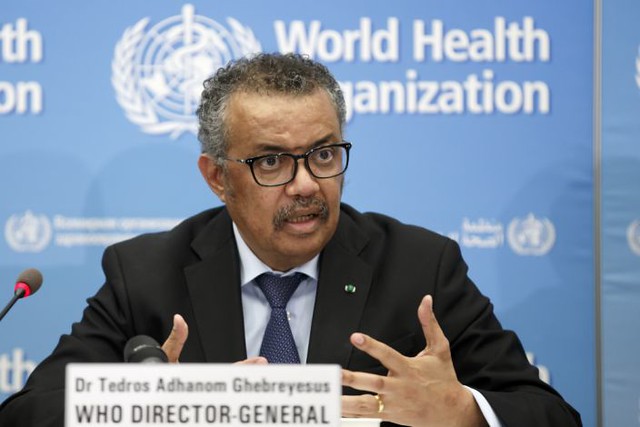Five monkeypox deaths have been recorded worldwide.
The World Health Organization [WHO] has declared monkeypox a “global health emergency”, a live media briefing on Saturday confirmed.
The press conference, chaired by WHO Secretary-General Tedros Adhanom Ghebreyesus, said the UN agency’s assessment of the viral infection is that the risk of monkeypox is moderate globally and in all regions, except in the European region where we assess the risk as high.”
“There is also a clear risk of further international spread, although the risk of interference with international traffic remains low for the moment,” Dr Tedros said.
“We have an outbreak that has spread around the world rapidly, through new modes of transmission, about which we understand too little and which meets the criteria in the International Health Regulations.”
“For all of these reasons, I have decided that the global monkeypox outbreak represents a public health emergency of international concern,” the WHO chief said.
Dr Tedros noted a criteria of five points to make the decision.
“First, the information provided by countries – which in this case shows that this [monkeypox] virus has spread rapidly to many countries that have not seen it before.”
“Second, the three criteria for declaring a public health emergency of international concern under the International Health Regulations, which have been met.”
“Third, the advice of the Emergency Committee, which has not reached consensus.”
“Fourth, scientific principles, evidence and other relevant information – which are currently insufficient and leave us with many unknowns.”
“Fifth, the risk to human health, international spread and the potential for interference with international traffic,” Dr Tedros said.
WHO confirmed there are now more than 16,000 reported cases from 75 countries and territories, as well as five deaths.
What is monkeypox?
Monkeypox is a viral infection that occurs primarily in the tropical rainforest regions of Central and West Africa and may occasionally spread to other regions, according to Qatar’s Ministry of Public Health.
The virus was first discovered in 1958, with the first human case reported in Africa in 1970. However, this is not the first time the virus has spread outside of the bounds of the African continent.
Although Monkeypox belongs to the same virus family as Smallpox, its symptoms are milder.
The virus is spread by close contact therefore it is somewhat easily contained through precautionary measures such as as self-isolation and proper hygiene.
“Epidemiological investigations are ongoing, however, reported cases thus far have no established travel links to endemic areas. Based on currently available information, cases have mainly but not exclusively been identified amongst men who have sex with men seeking care in primary care and sexual health clinics,” WHO reported.
“What seems to be happening now is that it has got into the population as a sexual form, as a genital form, and is being spread as are sexually transmitted infections, which has amplified its transmission around the world,” said WHO official David Heymann, an infectious disease specialist.
Symptoms
If you get infected with monkeypox, it usually takes between 5 and 21 days for the first symptoms to appear. According to the NHS, the first symptoms include:
- a high temperature
- a headache
- muscle aches
- backache
- swollen glands
- shivering (chills)
- exhaustion
A rash, which usually starts in the face before spreading to other parts of the body, usually appears 1 to 5 days after the first symptoms.
The rash starts as raised spots, which turn into small blisters filled with fluid before then transforming into scabs that later fall off.
The symptoms usually clear up in a few weeks though patients with monkeypox can pass it on to other people.
Monkeypox in Qatar
The first case of monkeypox was registered in Qatar, the Ministry of Public Health (MOPH) confirmed on Wednesday.
The case was detected in a traveller returning to Qatar from abroad. The patient is undergoing isolation at the hospital and is receiving the necessary medical care with adherence to the national protocol for managing confirmed cases of monkeypox, MOPH announced.
Any individual that had been in close contact with the confirmed case has been traced, and is being monitored for 21 days in order to track potential developments of the monkeypox symptoms.
MOPH further announced that all the necessary protective measures in line for the early detection of suspected monkeypox cases have been carried out. Detection and diagnosis capabilities have also been provided in national laboratories, with updates of regulations and guidelines for managing the disease also being laid out.
MOPH, in coordination with the World Health Organisation (WHO), is keeping a close eye on the global and regional epidemiological situation, to ensure the healthcare sector’s readiness and ability to place a tight grip on any future developments.
In the announcement, MOPH recommended that the community members should comply with the precautionary health advice, especially during travel.
For questions or any enquiry related to Monkeypox, people can reach the 24-hour health sector support line by calling 16000.







